
2022 London CENTRAL � Michael
interview � Action not words – Black
month
� Why pro
– the
solicitor’s experience
bono?
THE OFFICIAL JOURNAL OF THE WESTMINSTER & HOLBORN LAW SOCIETY | AUTUMN
Polak
history
by Lloydette Mai Barrow
bono
trainee
Lawyer Why pro


XXXXXXXXXXXX 2 | CENTRAL LONDON LAWYER Don’t change what you do. Just make it easier to do.
how Clio makes legal practice management easier. Discover Clio today at clio.com/uk/central-london or call
See
+44-800-433-2546.
PUBLISHER
Benham Publishing
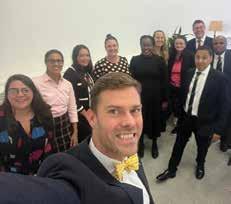

Aintree Building, Aintree Way, Aintree Business Park, Liverpool L9 5AQ

Tel: 0151 236 4141 Fax: 0151 236 0440 Email: admin@benhampublishing.com Web: www.benhampublishing.com
 ACCOUNTS DIRECTOR Joanne Casey SALES DIRECTOR Karen Hall
ACCOUNTS DIRECTOR Joanne Casey SALES DIRECTOR Karen Hall

 STUDIO MANAGER Lee Finney
STUDIO MANAGER Lee Finney
PUBLISHED
Autumn 2022 © Benham Publishing Ltd.
LEGAL NOTICE
© Benham Publishing. None of the editorial or photographs may be reproduced without prior written permission from the publishers. Benham Publishing would like to point out that all editorial comment and articles are the responsibility of the originators and may or may not reflect the opinions of Benham Media. No responsibility can be accepted for any inaccuracies that may occur, correct at time of going to press. Benham Publishing cannot be held responsible for any inaccuracies in web or email links supplied to us.
DISCLAIMER
All views expressed in this publication are the views of the individual writers and not the society unless specifically stated to be otherwise. All statements as to the law are for discussion between members and should not be relied upon as an accurate statement of the law, are of a general nature and do not constitute advice in any particular case or circumstance.
Members of the public should not seek to rely on anything published in this magazine in court but seek qualified Legal Advice.
COVER INFORMATION
Unsplash.
CENTRAL LONDON LAWYER | 3
MEDIA No. 1893
05 President’s Foreword 12 WHLS Events 14 International 15 Junior Lawyers Division 16 Report of the Outgoing President 17 Just you, you and only you 18 Intersectionality 23 Avoiding a Pyrrhic Victory 24 Pro Bono Week 2022 25 Why pro bono? 26 Actions not Words –Black History Month and Pro Bono 27 Michael Polak interview 31 A Pro Bono Journey 32 Why pro bono –the trainee solicitor’s experience Contents 05 Copy Deadline 20th January 2023 For the February 2023 edition Advertising Anyone wishing to advertise in Central London Lawyer please contact Catherine McCarthy before the copy deadline. 0151 236 4141 catherine@benhampublishing.com Editorial Members wishing to submit editorial please send to: cwhlawsoc@gmail.com Editor in Chief: Kene Onyeka Allison. Editorial Board: Lotus Kimona, Anamitra Mukhopadhyay and Sadie Thompson & Anita Winsome. Follow us on social media 18 16 27
Photo by Brett Jordan on

XXXXXXXXXXXX 4 | CENTRAL LONDON LAWYER How’s the weather looking this working week? Cloudy, but brighter with Quill. Quill’s cloud-based legal software is chock-full of new and improved features, giving you everything your law firm needs to manage your cases, contacts, and bills in just a few clicks. The result? A clear workflow, and a clearer head, no matter the weather. SCHEDULE A DEMO TODAY! 0161 236 2910 sales@quill.co.uk quill.co.uk MONDAY TUESDAY WEDNESDAY THURSDAY FRIDAY
The President’s Foreword
AUTUMN 2022
Dear Members, I am delighted to be writing to you as the new President of Westminster & Holborn Law Society, I am incredibly grateful for this opportunity. I would like to say a huge thank you to Matthew Allan, personally and on behalf of the Society for all the hard work, time and energy he put into serving the Society as a very dedicated President. Matthew hosted the Society’s Annual Dinner 2022 on 10 November 2022, at the National Liberal Club which you can read about in this issue.
The focus of this issue is pro bono work. I am very grateful to David Abbott, Chief Executive of Free Representation Unit and member of the Society’s Pro Bono and CSR Committee, for being Guest Editor of this season’s issue. Thank you, David and thank you to Kene Onyeka Allison, the Editor-In-Chief and to everyone on the board of Central London Lawyer magazine for your incredible work. We all hope you enjoy reading about the fantastic and inspiring pro bono work being carried out.
In addition to the aforementioned dinner, this quarter, we also hosted an incredible Autumn Reception in the Cholmondeley Room and Terrace at the House of Lords. It was a wonderful evening and we were very pleased to have spent much of the evening on the terrace enjoying a unique view of the Thames. We have also hosted some excellent educational events.
Internationally, we are proudly twinned with seven other law societies in Europe including Il Lustre Col Legi de l’Advocacia de Barcelona (ICAB), who hosted a WHLS delegation in October to participate in a superb programme they put together for us, and the Barreau de Paris, who have kindly invited the Immediate Past President and I to celebrate the Rentrée du Barreau de Paris (Opening Ceremony of the Paris Bar), which I will update you on in the next edition. We look forward to hosting our twinned bars in London so that more of our members can make contacts and friends in other jurisdictions, which may be useful for work but may also just be interesting and fun, all of which we like to promote as a Society. Please do feel welcome to join us on future trips abroad when you see them advertised.
I am proud of our Society, its officers, those on our committees and our members. It is truly inclusive and welcoming to all, we are from so many different backgrounds and on a variety of paths, in private practice, and in-house, in a range of types and sizes of firms and companies, from junior and aspiring lawyers through to Partners and General Counsel, entrepreneurs, and in traditional and non-traditional roles.
The Society provides its members with brilliant events, both social and educational, formal and informal. As well as hearing from inspirational speakers, our platform lends itself to thoughtprovoking discussions, encourages aspiration and provides opportunities to gain knowledge. The Society creates a breeding ground for ideas, partnerships and collaborations, and of course we have an enjoyable time.
We all have highs and lows in our careers, we may stay with one firm or company for all of our career, we may move often, or we may be somewhere in between. Life throws so many challenges at us that forces change, both good and bad, career and otherwise. I want Westminster & Holborn Law Society to be your constant throughout your career, throughout your life, a place where you can come and relax in good company, picking up a little inspiration, knowledge and fun along the way. I hope that each of you come away from our events feeling glad to be a lawyer and one of our members.
We want to make getting involved in our Society and joining committees even more accessible. If you’re keen to get more involved in the Society, please do consider joining one of our sub-committees:
� Education & Training � Equality, Diversity & Inclusion
� Events & Sponsorship � International





� Junior Lawyers Division � Law Reform � Membership




� Pro Bono & CSR � Publicity & Social Media
For more information, please send an email to: cwhlawsoc@gmail.com
We have many events in the pipeline for 2023 so please look out for updates via email and, if not already, please do follow us on LinkedIn (Westminster & Holborn Law Society), Twitter (@cwhls) and Instagram (@westminsterholbornlawsociety).
I wish you all a very happy Christmas and a prosperous 2023 and I look forward to seeing each of you in the near future. �
Rubbert President Westminster & Holborn Law Society
SPONSORS
CENTRAL LONDON LAWYER | 5 INTRODUCTION
Nicola
Nicola Rubbert

Nicola Rubbert President
Nicola is looking forward to the year ahead as President of Westminster & Holborn Law Society. Nicola is a commercial and employment solicitor. Nicola is a Council Member of The Law Society of England & Wales, representing the constituency of Westminster. Nicola is a former Chair of WHLS’s Education & Training Committee and still sits on the committee, and is a former Chair of London Young Lawyers Group.
Philip Henson Vice President
Philip Henson is a Partner and the Head of Employment at international law firm EBL Miller Rosenfalck, based in Farringdon. He also heads the North America desk and the China desk of the firm. He is the Chair of the WHLS Law Reform Committee. Phil and the committee research and reply to consultations on changes to legislation. Phil is looking forward to being more involved in the Society as the Deputy Vice President. Phil is involved in various charities and he is the Editor of City Solicitor magazine (the magazine of the City of London Law Society). Outside of a busy work and family life, Phil also produces and occasionally writes short films. He has recently finished a script for a dark comedy called Viking Funeral which he plans to develop in 2022.
Nicola Wainwright Deputy Vice President


Nicola Wainwright is a specialist clinical negligence solicitor with more than 20 years’ experience. She is a Partner and Head of Clinical Negligence-London at JMW Solicitors LLP. Nicola specialises exclusively in clinical negligence claims for patients arising from medical treatment that has gone wrong, or from a failure to provide medical treatment. She has expertise in a wide range of claims, but particularly those that are complex or that result in severe, life changing injuries. Nicola has been ranked in Chambers & Partners legal directory for 14 years and has been described as a ‘highly experienced lawyer who achieves great results’ for clients. Clients describe her as ‘incredibly empathetic and understanding’ and as ‘having great communication skills’. Nicola qualified as a solicitor in 1997 after training with Pictons. She specialised in personal injury and clinical negligence at Davies & Partners, Birmingham before joining Leigh Day in 2000, since when she has specialised exclusively in clinical negligence. She was at Leigh Day for 20 years before joining JMW. Nicola is a member of the Law Society Clinical Negligence Accreditation Panel and an Association of Personal Injury (APIL) Senior Litigator. Nicola sits on the Westminster & Holborn Law Society CSR and Pro-Bono Committee. She is also a member of FOCIS (Forum of Complex Injury Solicitors), and the Association of Women Solicitors, London (AWSL).
Kene Onyeka Allison Editor in Chief
Kene is an in-house solicitor at Mizuho International plc, a Japanese investment bank. She is dual-qualified in England & Wales and Nigeria. Her areas of specialisation are Debt Capital Markets and Derivatives. She is the co-chair of the British Nigeria Law Forum Women’s Network and volunteers in different capacities with different organisations with the aim of improving ethnic and minority diversity.




Luke Silverman Administrative Secretary
Luke is a Trainee Solicitor at Macfarlanes LLP and the current Administrative Secretary to the Westminster and Holborn Law Society. Luke has a particular interest in matters concerning cryptocurrency as well as how the legal industry can become more Green. In his spare time, Luke is a keen cyclist and can be found speeding around Regent’s Park in the early hours of the day.
Matthew Allan Immediate Past President
Matthew is a solicitor-advocate at Greenwoods specialising in commercial litigation and international arbitration. He is also the Vice Chair of the Society’s International Committee which develops professional links with lawyers and their clients throughout Europe and further afield, with a particular focus on his native Canada. As the Immediate Past President of the Society, Matt’s priority is to continue his efforts growing the commercial connections with our twinned bar associations.
CENTRAL LONDON LAWYER | 7 WHLS OFFICERS


XXXXXXXXXXXX 8 | CENTRAL LONDON LAWYER Ci Self-Issue Insurance from Legal & Contingency provides an immediate solution to your conveyancing needs, offering wide-ranging Residential and Commercial cover at highly competitive premiums. Our facility gives you easy access to: • Instant issue Single and Multi-Policy cover • Backdating and shared access functionality • Online indemnity top-ups • A full quote and purchase history • A choice of payment methods … all at the touch of a button. Our team is on hand to assist you, backed up by our Fast Track bespoke service for risks that may fall outside of the self-issue criteria. Today’s conveyancing demands instant results. Conveyancing Insurance (Ci) Self-Issue is a portfolio of insurance products provided by Legal & Contingency Limited. Legal & Contingency Limited is authorised and regulated by the Financial Conduct Authority. Registered in England No.03511606. Explore our online portal here: 020 7397 4363 enquiries@conveyancinginsurance.co.uk www.conveyancinginsurance.co.uk
Kene Onyeka Allison
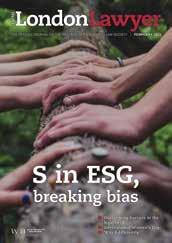
Kene is an in-house solicitor at Mizuho International plc, a Japanese investment bank. She is dual-qualified in England & Wales and Nigeria. Her areas of specialisation are Debt Capital Markets and Derivatives. She is the co-chair of the British Nigeria Law Forum Women’s Network and volunteers in different capacities with different organisations with the aim of improving ethnic and minority diversity.


Sarah Bradd
Sarah is a Paralegal and a Future Trainee at Charles Russell Speechlys working for the Development Sales and Regeneration Teams. She is currently working towards completing her Fellowship for CILEx having completed her LLB at the University of Law. She is looking forward to starting her Training Contract in 2023. Sarah enjoys spending time on holiday exploring new places. When not working, she loves eating at restaurants and going to the cinema.
Lotus Kimona


Lotus works as a Legal Assistant in the matrimonial department at Hepburn Delaney. She has experience across different areas of commercial law but decided that family law is her preferred specialism. When not working you can find Lotus on a netball court, reading, spending time with family and friends or at her favourite coffee shops.

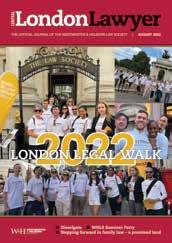


Anamitra Mukhopadhyay
Anamitra is a solicitor within JMW Solicitors LLP’s Commercial Litigation and IP departments. Anamitra advises clients across various sectors on a variety of matters including IP infringement issues, contractual breaches and civil fraud. Prior to entering the world of law, Anamitra completed a History degree and has a passion for the subject. Aside from History, Anamitra’s other love in life is music. She is a keen singer and enjoys performing.

Sadie Thomson
Sadie is an Associate within the Business Crime and Regulatory department at JMW Solicitors LLP. She advises individuals and companies in respect of various allegations including financial crime, violence, drug and motoring offences. Sadie joined the Manchester office of JMW in 2017, having completed a History degree at the University of York. She transferred to the London office in 2022 and is enjoying all that the city has to offer!
Anita Winsome
Anita is an LLM student specialising in Comparative & International Dispute Resolution at Queen Mary University of London. Her interests include domestic & international arbitration, competition law and intellectual property rights. She is a qualified lawyer in India and is a licensed member of the Bar Council. Her favourite pastime activity includes exploring the beautiful cafes, museums or the parks at South Kensington.
CENTRAL LONDON LAWYER | 9 WHLS EDITORIAL TEAM
To advertise in Central London Lawyer, please call Catherine McCarthy our Business Features Editor on 0151 236 4141 or email catherine@benhampublishing.com Want to feature in Central London Lawyer?
WHLS Social Media Committee Update New Members
Jessica Hynes Co-chair
Jessica is a second-year trainee currently seated in the Contentious Trusts and Estates team at Farrer & Co. Prior to this she completed a Bachelor of Laws at the University of Kent, Canterbury. Jessica enjoys spending her free time travelling to see family in New Zealand and Saudi Arabia, cooking for friends and walking her puppy on Hampstead Heath.
Tess Hulton Co-chair
Tess is a second-year trainee sitting in the Family team at Farrer & Co. Prior to this, she studied Classical Archaeology and Ancient History at Oxford before working in a bank and an auction house. She enjoys visiting art galleries, reading and spending time with friends.
Stephanie Keen
Stephanie is a first-year trainee currently in the Corporate team at Farrer & Co. Prior to joining, she worked within the Civil Service, and has worked in the following sectors: Diversity & Inclusion, Public Relations, Real Estate, Technology, and Law. Stephanie read History for both her BA and MA at University College London. In her spare time, she does martial arts, and is a frequent gym-goer. She also enjoys reading, cooking, and getting out-and-about with family and friends.
Méabh Kirby
Méabh is a first-year trainee sitting in the Contentious Trusts and Estates team at Farrer & Co. She studied her undergraduate law degree at Trinity College Dublin and Bachelor of Civil law at Oxford. Prior to joining Farrers, Méabh worked as a litigation paralegal in an international group litigation firm. She enjoys reading, running, yoga and volunteering.
Toby Stacey
Toby is a first-year trainee in the Intellectual Property and Commercial team at Farrer & Co. He completed his undergraduate law degree at the University of Warwick. Outside of work, he enjoys diving, going to the cinema and concerts, and developing his podcast.
Nedra Daniel
Nedra is currently a Property Finance paralegal at Brecher LLP. As a career changer, Nedra has transitioned from the rigorous and regimented life in the Armed Forces to a career in law and looks forward to qualify as a solicitor some day. She has completed the LPC(LLM) at the University of Law. When not in the office, Nedra love to spend time with her son, immerse herself in a good crime novel and attend various social events. �
Treasurer and Deputy Treasurer roles
Are
Do
Do you want to join the Main Committee of the Westminster and Holborn Law Society?
The please consider applying for the Treasurer, or Deputy Treasurer roles within the Westminster and Holborn Law Society.
The Treasurer Role involves
� Being part of the Main Committee and being the first port of call on financial matters.
� Promoting the work of the Westminster and Holborn Law Society.
� Managing our bank account.
� Reviewing our current bank account arrangements to ensure that we are getting the best value for our members, and the best service delivery from our current bank for the needs of the Management Team and the Committee, and (if necessary) searching for alternative providers.
� Acting as one of the signatories on the account and liaising where necessary with other signatories.
� Ensuring strong fiscal management of our financial accounts, and helping the Committee seek best value for our members at every opportunity.
� Liaising with our accountants to prepare draft accounts for approval, and to file the approved accounts annually at Companies House.
� Liaising with sponsors, and helping to seek sponsors of our events, and arranging for payment of supplier/events.
� Liaising with the Main Committee, and any sub-committee, to reconcile monies from events.
� Arranging prompt payment of approved expenses.
The Deputy Treasurer role
We continue to encourage deputies to all main roles to allow our members to gain leadership and management experience, and to learn valuable skills and to help us to plan for succession purposes.
We are keen to encourage any of our members to apply for the Treasurer or Deputy Treasurer role. Please reach out to Nicola Rubbert, or Philip Henson to express your interest.
Or speak to any of the members of the Committee at our social events. Or send an email to CWHLS Admin at the following email address: cwhlawsoc@gmail.com. Thank you. �
10 | CENTRAL LONDON LAWYER WHLS TEAM
you looking to make a difference to your local law society?
you want to develop your leadership skills?
WHLS Membership – time to renew!
Representing the 20,000 solicitors across Westminster, Holborn and Central London
It was wonderful to see so many of you at our Autumn Reception at the House of Lords and at our Annual Black-Tie Dinner at the National Liberal Club. These were just two of the fantastic WHLS events held during the past year, with more to follow.
Membership is the cornerstone of our organisation and we rely on your subscriptions to be able to offer our events and magazine. The Society membership year runs from October to October and 2022-23 annual subscriptions are now due. If your details have not changed, kindly pay the invoice sent by email. If you have changed employers or if your status has changed, such as from trainee to solicitor, please fill out a membership form so that we can update your details. If you're not yet a member you can easily join by completing the online form at www.cwhls.org.uk on the Join Us page and following the payment instructions.
For enquiries regarding Corporate Membership, please email Joanne Skolnick at cwhlawsoc@gmail. com. If you are an individual member, please consider approaching your firm about Corporate Membership.
There are many benefits to joining our vibrant, diverse and welcoming group of legal professionals. What sets us apart from other societies is our links to regional and international legal organisations. We are a part of the Fédération des Barreaux d’Europe and are twinned with the Paris, Berlin, Milan and Barcelona bar associations, to name a few. Other benefits include:
� Numerous professional development and networking events, including updates on important legal and practice developments. Our professional development events are a great way to hone your legal skills and knowledge while meeting other legal professionals. Our social events are a relaxing and enjoyable way to mingle with your peers.
� Free attendance for members at most Society events.
� Free subscription to the Society's quarterly magazine, Central London Lawyer, and the opportunity to contribute articles to showcase your legal expertise, promote issues you care about and highlight an important case your firm just won.
� Opportunity to share your ideas and develop leadership skills through involvement in our committees.
� Invitations to events with other law societies and legal organisations across London, Europe and internationally. There are opportunities to visit European bar associations throughout the year.
� Welcome reception for new members.
� A Junior Lawyers' Division, with membership open to trainee solicitors and other junior lawyers, law students, barristers and pupils.
� Opportunity to apply for, or nominate a candidate for, the Gamlen Prize or the Rising Star Award.
� A voice on the national Law Society's Council through the election of local Council members.
� Promotion of members' achievements in our magazine and through our social media.
We greatly appreciate your past support and look forward to your continued participation in our Society. All members have a vital role to play in our continued success. We welcome new members so please spread the word about our Society to friends and colleagues. And we hope to see you at our next event! �
Joanne Skolnick Chair, Membership Committee Westminster & Holborn Law Society

CENTRAL LONDON LAWYER | 11 WHLS MEMBERSHIP
WHLS 2022 Annual Dinner at the National Liberal Club
On 10 November, the Society hosted its annual dinner in the grand surroundings of the National Liberal Club. We were grateful to the 110 guests who joined us for the evening, having battled through the inconvenience of an ill-timed Tube strike to make it. A champagne reception in the Victorian glory of the Club’s smoking room was followed by dinner in the David Lloyd George room – fittingly named after the UK’s only solicitor Prime Minister.
It was an excellent opportunity to meet up with our members, old and new, and particularly to catch up with our international guests who made the trip. Joanna Wsolek from the Krakow Bar Association, with which WHLS is twinned, joined us and I was pleased to present her with a gift from the Society in recognition of the inspiring work that she and her colleagues have done – and are continuing to do – to raise funds and provide humanitarian assistance for those suffering in Ukraine as the war drags on. On the night itself, we managed to raise over £1,000 in donations with more being raised by online contributions. We were also pleased to welcome back to London Calin Luga of the Cluj-Napoca Bar Association of Romania, who has also worked tirelessly to assist colleagues in Ukraine, and Michele Calantropo of the Palermo Bar Association, one of our most recently twinned bars.
As has become the hallmark of these events, we witnessed the full breadth of our Society’s members mingling merrily with each other, from law students to managing partners. An egalitarian reflection of some of the liberal virtues upon which our venue for the evening had been built.
A special thanks goes to the Club itself for kindly sponsoring the after dinner drinks. This allowed the conversations and networking to continue into the evening and was much appreciated by guests. The Club prides itself on its inclusivity and comprises 45 clubs, circles and forums and an impressive reciprocal listing of almost 400 clubs around the world. For those interested, more information about the Club can be found at https://nlc.org.uk/
Current President, Nicola Rubbert, intends to host the Society’s 2023 annual dinner in its more traditional spring timing for the next instalment, so watch this space (and the Society’s social media) – and keep your fingers crossed that TfL cooperates with us! �
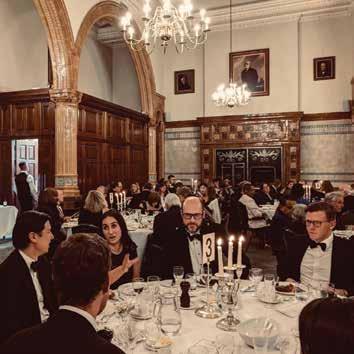
The Autumn Reception at the House of Lords
The Autumn Reception at the House of Lords on the Terrace was a wonderful evening for all to catch up with colleagues and to welcome new members to the CWHLS. The spectacular views overlooking the Thames onto London added to the evening and celebrations.
It was inspiring to hear from the winners from the FBE Human Rights Oratory Competition and congratulate them on their achievements. Well done to the International Committee for making the competition such a success.
We are all very much looking forward to more networking events in the future.
Thank you to the officers of the CWHLS for organising a brilliant evening. �
Sarah Bradd
12 | CENTRAL LONDON LAWYER EVENTS
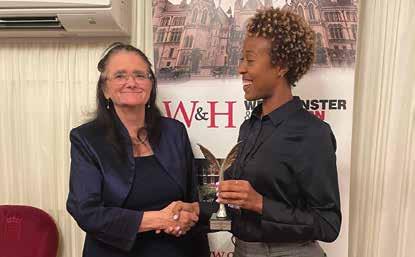

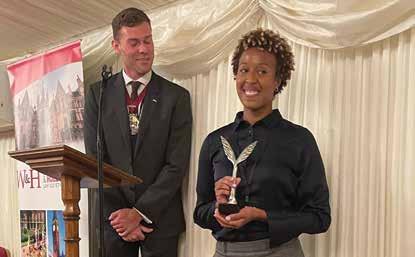
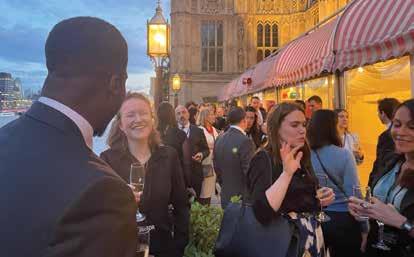

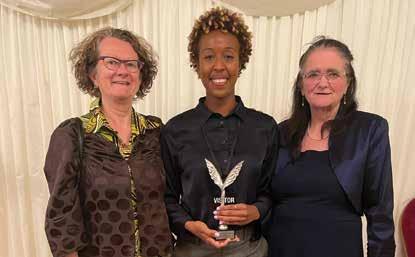


CENTRAL LONDON LAWYER | 13 EVENTS
Westminster & Holborn members in top three orators in European competition

The Federation of European Bars FBE Human Rights Oratory Competition took place in Bilbao in September, with two of our junior members in the semi-final.
Lianne Walters of Leigh Day, and Laurent Sammouri of Kings College, were among 17 young lawyers who competed with their speeches on the topic “War Crimes”. The judges heard very different narratives and approaches from the participants who came from Romania, France, Spain, Poland, Netherlands, Italy and the UK. It was no surprise to the audience that both of the WHLS members received the highest marks in the semifinal. The judges were looking for advocacy skill and content. The competition took place over two days, and the results of the semi-final were given at the end of dinner in one of the best restaurants of Bilbao.
On Day two of the competition, the four contestants in the final, our two members and a lawyer from Romania and a lawyer from Italy, were put into two teams at random and given the subject “The Ukraine justice system can give a fair trial to Russians accused of war crimes” to debate. Given only 90 minutes to prepare, the contestants made it very hard for the judges, as they were very persuasive. As the tension mounted in the hall of the Bilbao Bar, the results were announce, with a narrow win for Ronald Elek from Romania, and coming a close second, Laurent Sammouri of Kings College, third Liane Walters of Leigh Day.
At the House of Lords WHLS Autumn event our two winners were presented with their awards by WHLS President Matthew Allan. WHLS are proud to support junior lawyers and any members who would like to know more should contact: sarachandler.lawsociety@gmail.com �
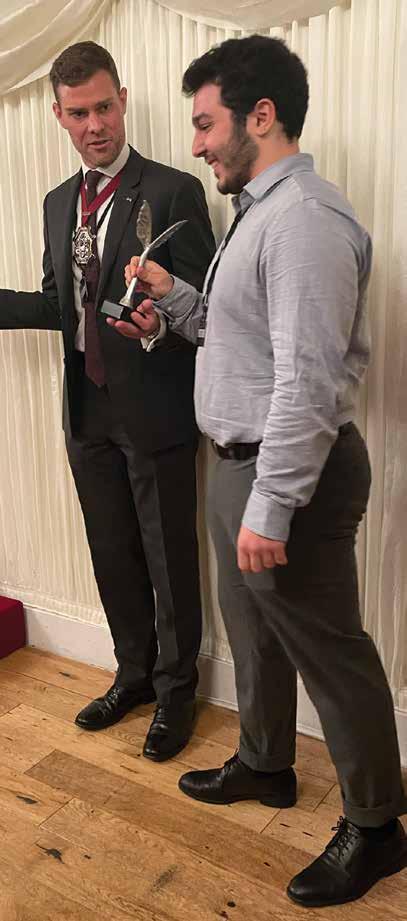
14 | CENTRAL LONDON LAWYER INTERNATIONAL
WHLS in Barcelona
As a member of the Westminster and Holborn Law Society (“WHLS”), I was delighted to be a part of this year’s visit to the Barcelona Bar Association from 6 to 7 October, organised by the WHLS International Committee. Many years ago, this twinning agreement was signed between the respective organisations in the hope that it would build on the already strong links of friendship between London and Barcelona. Well, it has certainly achieved that!
This year, the Barcelona Bar Association opened its doors and welcomed me along with several other WHLS committee members at the Il-lustre Collegi de l’Advocacia de Barcelona (“ICAB”)! They had organised a range of activities for us to promote collaborations and networking and provided us with a unique opportunity to strengthen our relationships with lawyers in Barcelona.
The event kicked off with a glorious breakfast and welcome by leading Council Member who shared details about the work that they do at ICAB and their passion for the institution and profession. We were told ICAB is the “casa” (home) of Spanish lawyers and that this was our “casa” (home) too.

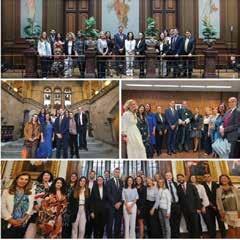
We were lucky enough to receive training sessions on the legal system in Spain by experienced Spanish lawyers, covering a range of topics including Spanish civil procedural law, criminal procedural law, employment and family law, and doing business and investing in Spain. The session was followed by a cocktail networking session with ICAB lawyers and a visit to the incredible ICAB library, which is considered to be one of the most important private law libraries in Europe, with more than 300,000 volumes. It remains truly remarkable. The afternoon was filled with tapas and visits to local law firms in Barcelona. Both a delightful taste of what Barcelona has to offer and a great way to sample the local talent!
The second day of the event started bright and early with a visit to Barcelona’s City of Justice. This is a recent architectural development hosting most of Barcelona’s legal departments, which were previously scattered around the city in 17 separate buildings. We received our very own private tour of the City of Justice and were fortunate enough to attend a live trial. Great to see a trial in action! A visit to the Palace of Justice, built in 1908, took place afterwards and demonstrated such beautiful architecture. The closing dinner was attended by a number of Spanish lawyers and took place in the district of ‘Barceloneta’ overlooking the port. A great opportunity to reflect on the time spent together and the opportunities each of us would take away from the event.
I feel so lucky to be a part of this international network and the event was arranged perfectly by ICAB and the WHLS to reinforce contacts and create synergies. It was brilliant to meet so many interesting and experienced Spanish lawyers and I look forward to crossing paths in the future. A special thanks goes to those involved in ICAB and WHLS for your involvement in organising and participating in such a successful event. The pressure is certainly on for ICAB’s next visit to London – I, Dawson Cornwell and WHLS look forward to welcoming our Spanish colleagues!
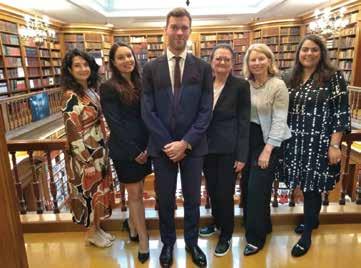
I would strongly encourage members of all age to get involved with WHLS – it presents a plethora of possibilities! Hasta la vista! �
 Felicia Munde Solicitor Dawson Cornwell
Felicia Munde Solicitor Dawson Cornwell
CENTRAL LONDON LAWYER | 15 JUNIOR LAWYERS DIVISION
Report of the Outgoing President
It has been a pleasure and privilege to serve as your President for this past year. I have often joked about how egalitarian this Law Society is, pointing to the simple fact that you have even let a Canadian be President. Many a true word is spoken in jest, as they say.
I joined this Society while I was still a trainee and became involved with the International Committee shortly afterwards. I did not think for a second that five years later I would be concluding a term as president.
The opportunities that this Society affords those that are willing to get involved is not limited by your title, or age, or, indeed, whether or not you are Canadian or otherwise. It is a democratic and – at the risk of blowing my own trumpet – a meritorious group of like-minded professionals. We are a diverse and vibrant representation of our modern profession, and a look at our recent roster of presidents is an endorsement of this fact. I have been very fortunate to have spent the last year with highly capable and enthusiastic fellow Officers and Main Committee to work alongside, for which I extend very grateful thanks.
We have worked hard together over the past 12 months, and over the course of the last few years of COVID, to ensure that the Society remains as active as it can. Not just for the sake of it, but because we have all cared about supporting the profession and each other, particularly during difficult times.
When my term started in October 2021 – in a room where our numbers were restricted by government mandate – we were cautiously optimistic that things were going to get better sooner than later. I was certainly not expecting to be the second CovidPresident of the Society, but I am hopeful that I may be its last.
Throughout the first few months of my Presidency, we continued to hold a number of online webinars for members. Engagement remained tricky but we put on a solid program of events to keep people tuning in. We are happily now in a place where our corporate Zoom account no longer seems like our only lifeline.
As soon as we were able to, we started to look for opportunities to host events in person and to revive the lifeblood of the Society. Our Christmas Party at Middle Temple was a huge success, featuring many of the great and good of our local legal world, in addition to an unexpected appearance by Legal Santa *Clause* riding a mechanical reindeer. (I understand that photographs of Santa’s resultant split trousers are still circulating on the dark web.)
We also leapt at the chance to host an international delegation from the UIA for a gala dinner in April, allowing us to rekindle our cross-border relationships again. We have raised funds for embattled colleagues in Ukraine and presented an award to our friends at the Krakow Bar Association in recognition of their efforts to bring humanitarian aid directly to those people who were tragically underserved outside of major Ukrainian cities.
We held a great summer party in July and equally great reception at the House of Lords in September which shone the spotlight on recent achievements by our members. Despite the challenges faced this year, our membership, including corporate members, has actually risen, which I think signifies we are doing something right.
My goals for the year were to harness the enthusiasm of our volunteers and to increase our international connectivity. It came at a time when being connected to others meant more than we had ever imagined it would. I am proud that we have built links with colleagues in the Canadian and American Bar Associations, formalised a twinning agreement with the Paris Bar and undertaken a delegation to the Barcelona Bar Association. We will continue this endeavour by traveling to Palermo for the FBE conference in November as well as returning to Paris for the opening of their legal year.
These sorts of events speak volumes about our ability to get involved at all levels of the profession and to support our members and clients at home and abroad. It also allows us an opportunity to foster our understanding of others, professionally and personally and to build our networks beyond our immediate surroundings. These delegations remain open to all members, and I hope that as we plan our future trips, we will continue to see more joining us to grow their own networks and business relations.
I have enjoyed my year despite the Covid interludes and would like to reiterate my thanks to everyone who has contributed towards making it a success. I would also like to extend huge personal thanks and best wishes to our in-coming president Nicola Rubbert, for her year at the helm. I am sure she will do great things for the society – far beyond what a mere mortal like myself could muster!
So, once again, thank you for the opportunity and for the experience. It has been a great excuse to dust off my bow tie and I look forward to dusting it off again soon at the annual dinner, when I hope to see many of you there.
Keep your stick on the ice. �
Matthew Allan Immediate Past President Westminster & Holborn Law Society
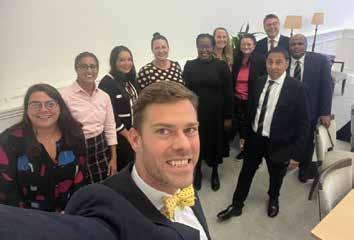

16 | CENTRAL LONDON LAWYER REPORT
Just you, you and only you
– a redundancy selection pool of one!
Aprocedural failure in a redundancy process is often a stumbling block for employers defending an unfair dismissal claim. The recent case of Mogane and Bradford Teaching Hospitals NHS Trust EAT 139 2022 is a stark warning to those employers who adopt a selection pool of one in a redundancy situation. The Employment Appeal Tribunal (EAT) has emphasised the importance of meaningful consultation at the outset of a redundancy process and that a pool of one may be unfair without consulting with the affected employee first.
The facts
A band six nurse was placed in a redundancy selection pool of one because her fixed term contract was due for renewal. Her colleague, also a band six nurse, was not included in the pool because her fixed term contract had been recently confirmed. The employer consulted with the employee following her selection but the Claimant’s role was made redundant. She was dismissed after she refused unsuitable alternative employment.
The Employment Tribunal concluded that there was a legitimate redundancy situation due to the financial situation in the nurse’s unit. It found no fault with the selection process and that the selection pool of one was appropriate in the circumstances.
The Claimant argued that there was no genuine or meaningful consultation because the employer had not discussed the selection pool with her, nor had there been consideration of whether the other band six nurse should have been in the pool. The facts showed that the decision to make the nurse’s role redundant was taken after she was placed in the pool. The employer responded there was no rule that consultation had to be at the very outset of the redundancy situation, or at every stage of the process.
The EAT disagreed with the lower court on the facts of the case. The employer had effectively sealed the nurse’s fate of dismissal by placing her alone in the selection pool because her contract was due for renewal. It was not in the band of reasonable responses in the absence of consultation to adopt one criterion which decided the selection pool. It was inevitable that her role would be made redundant in the circumstances, and the employer had in fact made the decision to make her role redundant prior to consultation. The EAT stated that the method of selection was a breach of the implied term of trust and confidence.
The EAT referred to key redundancy law cases. In particular, it referred to Williams v Compair Maxim Ltd [1982] ICR 156 and the guiding principles relied upon in collective redundancy cases. It considered there was no reason that these principles could not be applied in ordinary unfair dismissal cases.

i. fair warning of impending redundancies which includes possible alternative solutions and alternative employment; ii. agreement with the union on the criteria for selection of “at risk” employees. Following selection, the employer and union will consider whether the selection is in accordance with the criteria;
iii. the selection criteria should be objective as far as possible for example, attendance, efficiency at the job, experience, or length of service; iv. the employer will seek to ensure that the selection is made fairly in accordance with these criteria and consider any representations; v. consideration of alternative employment.
Judge Beard stated: “…the formative stage of a redundancy process is where consultation ought to take place according to the principles in Williams and the cases developed from it. The reason for consultation to take place at a formative stage is because that means that a consultation can be meaningful and genuine. That must mean that consultation, for a process to be fair, should occur at a stage when what an employee advances at that consultation can be considered and has the potential to affect the outcome.”
“…the question that the tribunal must answer in terms of reasonable responses is not just, is there a rational explanation for this pool? But the question: is it a pool that a reasonable employer could adopt in all the circumstances? …In all contracts of employment there is the implied term of mutual trust and confidence. That must mean that an employer will not act arbitrarily between employees. That requirement, it seems to us impacts on a decision as to selection pool.”
Comment
Whilst the Claimant’s claim in this case was upheld on its facts, it does not always follow that a redundancy selection pool of one will never be fair. There are no hard and fast rules regarding what constitutes a selection pool which will depend on the factual situation. A selection pool of one is likely to be appropriate where there is only one person who carries out a particular role which is no longer required. However, this may not always be clear cut and there may be complications where other employees carry out similar roles or where employees have transferrable skills. In these types of situations, consultation about selection at the outset is likely to be necessary to help avoid an unfair dismissal finding. �
EBL Miller Rosenfalck
CENTRAL LONDON LAWYER | 17 SUB-COMMITTEES
Helen Murphie
Intersectionality – identity beyond disability
The Paralympics 2020 launched the ‘WeAre15’ campaign to raise awareness of the 15% of the world’s population that are disabled. But being disabled does not define someone and equally there may be other parts of their identity which impact on the individual’s treatment. This article looks at the disability rights movement and the importance of intersectionality.

Intersectionality - “the analytical framework for understanding how aspects of a person social and political identity's combined to create different modes of discrimination and privilege,” according to black American feminist scholar, Kimberlé Crenshaw. The overlapping of these social identities may be equally empowering as they are oppressive. The conversation initially came about as a result of describing the different barriers women face according to their ethnicity, the movement called for better inclusion and understanding of the varying issues such as racism, women of colour face in seeking gender equality.
Intersectionality is affected by ethnicity, gender, age, sexuality, culture, class, religion and disability.
Crenshaw, coined the term ‘intersectionality’ in 1989. Reni Eddo-Lodge, had an interview with Crenshaw in 2014, where she explained why her law studies led her to intersectionality:
“That work started when I realised that African American Women were… not recognised as having experienced discrimination that reflected both their race and their gender. The courts would say if you don’t experience racism in the same way as a man does, or sexism in the same way as a white woman does, then you haven’t been discriminated against. I saw that as a problem of sameness and difference. There were claims of being seen as too different to be accommodated by law. That led to intersectionality, looking at the ways race and gender intersect to create barriers and obstacles to equality.”
Multi-faceted
Intersectionality moves away from the consideration of people within one segmented group to tackle discrimination and oppression but rather looks at the multifaceted and nuanced nature of an individual’s lived experience. Intersectionality is the belief that oppression is interlinked and cannot be solved or in fact, challenged by addressing one issue alone or that the issues are free-standing.
Being a person with a disability is one such identity which can cause a person to feel disadvantaged. Ableism, or the “discrimination in favour of able-bodied people” can come in many forms such as making buildings inaccessible, - preventing people with disabilities from accessing services, products,
18 | CENTRAL LONDON LAWYER
SUB-COMMITTEES
housing, or employment. One of the worst forms of oppression for those with disabilities is when derogatory terms are used to insult them, terms associated with their challenges in the form of weaponised language to denigrate or belittle them. People with disabilities may face other barriers based on the facets of their other identities, which would cause greater inequality.
Disability rights movement – an ugly history
When people think of the civil rights movement, they probably think of women’s suffrage, feminism and the LGBTQ+ rights movements. But like other civil rights movements, the disability rights movement is rooted in a dark and troubled history. The 1800’s saw disabled people forced to undergo sterilisation and enter institutions and asylums where they would spend their lives; viewed as individuals unfit for society, persons with disabilities were reserved for the object of ridicule and entertainment.
In the United States between 1867 and 1974, municipal statutes, retrospectively known as “Ugly Laws”, were introduced that outlawed the appearance of people in public deemed “diseased, maimed, mutilated, or in any way deformed, so as to be an unsightly or disgusting object” . These laws targeted the overlapping categories of the poor, the homeless, and those with visible disabilities.
These laws not only formed a legal foundation to the culture of purification which served to keep disabilities hidden from “a fearful and biased society” , they shaped the stigmatisation of disability which resulted in the social and economic marginalisation of persons with disabilities.
While the “Ugly Laws” targeted those with visible disabilities, eugenic sterilisation had far-reaching affects for those with less visible disabilities. A shift towards eugenics was an ill-informed way of preventing those with disabilities from being able to have children in an era where misconception and ignorance led to a misunderstanding of the reasons for certain disabilities and whether they could be inherited or passed down a family line. This being particularly the case for women with disabilities who were forcibly sterilised, the peak of which state-sanctioned sterilisations hit between the 1930s and 1940s, in some states continuing to rise during the 1950s and 1960s - a prime example of intersectionality at work. While involuntary sterilisation alludes to an historic practice, reproductive rights of disabled women continue to be denied through forced sterilisation and speaks into the wider pattern of the removal of rights of women and persons with disabilities.
While justification for the eugenic intervention of forced sterilisation fell to the alleged threat to the health and well-being of future generations – historically construed as an effort to protect “racial purity”, other social factors, such as the lack of adequate measures to protect against the sexual abuse and exploitation of women and girls with disabilities, continue to drive the practice today.
Disabled activists are on the rise and many of them are women engaged in the fight against austerity, but disability activism has been mainly gender-neutral. Disabled women are vulnerable to physical, sexual, psychological and financial abuse making the fleeing from an abuser even more difficult. Dr Amy Kavanagh, a blind disability rights activist and campaigner spoke of how her disability, which prevents her ability to easily identify an attacker or determine whether an imminent attacker is following or watching her, means she is more vulnerable. This experience displays the reality of many disabled women, with women with a disability almost twice as likely to have experienced sexual assault.
Further, hate crimes against people with disabilities is also increasing, making the need for activists to raise the voices of victims more important.
Current campaigns and the need for change
The Convention of Rights for People of Disabilities (CRPD) recognises intersectionality for disabled women. Article 6 for Women with disabilities, means that state parties of the CRPD recognise that women and girls with disabilities are subject to multiple discrimination, and in this regard shall take measures to ensure the full and equal enjoyment by them of all human rights and fundamental freedoms. The inclusion of a gender specific article in the convention talks directly to the gender-disability discrimination that reflects the need for gender-sensitive measures to guarantee the protection of the human rights and fundamental freedoms laid out within the legislation.
On a domestic level, disabled people in the UK are currently fighting for the continuation of the Independent Living Fund and access to Personal Independence Payment (PIP), Employment Support Allowance (ESA) and now, against the changes made to Access to Work – supportive instruments in place to allow those with illness, disability or mental health conditions financially manage their associated costs and bypass the barriers to access to work.
Disability campaigners also continue to fight for their access to transport after the government further extended exceptions from the access regulations to leaders in the rail, bus and coach industry. These access regulations, introduced to improve disability transport access, were supposed to be brought into force two years ago – the continued exceptions highlighting another failed promise to the disabled community and another barrier to their equality.
In more hopeful steps, the decade-long battle for stronger disability hate crime laws saw the Law Commission recommend legislative reform that ensures ‘Disabled victims receive the same protections as those experiencing hate crime due to race or religion’ in 2021. The recommendation comes as a milestone for people with disabilities and a triumph for intersectionality with the recommendation aligning disability with the other characteristics of a person that can be protected.
Raising the profile
The Paralympics 2020 launched the ‘WeAre15’ campaign in an attempt to raise awareness of the diverse nature of the disabled community which makes up 15% of the world’s population. By prompting discussions on issues surrounding disability and normalising the need for dialogue and conversations about how disabled people maintain their independence and what their needs are may help in removing the stigma behind disability.
Inevitably, the language used in all aspects of intersectionality is crucial when considering its impact. Negative language is likely to reinforce stereotypes and discrimination whilst using positive language empowers and builds support networks. This also applies to those with disabilities and the challenges placed by their environments and societal barriers which disabled people face whilst navigating the world. Intersectionality essentially, encompasses the varying levels at which people face oppression and discrimination. The Paralympics 2016 challenged the lexicon further by introducing the term ‘para-disability’ replacing the term disability or handicap. �
CENTRAL LONDON LAWYER | 19 SUB-COMMITTEES
The disabled community is vastly diverse. Be it a lifelong condition, or through accident, injury or genetics; the needs of those who make up the community is wide-ranging and unique to the individual. The manner in which physical, sensory or neurological challenges impact on all forms of discrimination are worthy of greater discussion. �
WHLS member Joanne
1. https://archive.voice-online.co.uk/article/%E2%80%98raceequality-gender-equality%E2%80%99
2. Oxford Dictionary
3. https://www.adl.org/education/resources/backgrounders/ disability-rights-movement
4. Chicago City Code 1881
5. https://www.adl.org/education/resources/backgrounders/ disability-rights-movement
6. https://ihpi.umich.edu/news/forced-sterilization-policies-ustargeted-minorities-and-those-disabilities-and-lasted-21st
7. https://www.sisofrida.org/disability-and-intersectionalitymultiple-identities-cumulative-discrimination/
8. https://www.theguardian.com/world/2021/nov/25/theeveryday-assault-of-disabled-women-its-inappropriate-sexualtouching-at-least-once-a-month
9. https://www.ons.gov.uk/peoplepopulationandcommunity/ crimeandjustice/articles/ sexualoffencesvictimcharacteristicsenglandandwales/ march2020#disability
10. CPS Guidance - Disability Hate Crime and other crimes against disabled people - prosecution guidance. Updated: 3 March 2022
11. 1. States Parties recognize that women and girls with disabilities are subject to multiple discrimination, and in this regard shall take measures to ensure the full and equal enjoyment by them of all human rights and fundamental freedoms.
2. States Parties shall take all appropriate measures to ensure the full development, advancement and empowerment of women, for the purpose of guaranteeing them the exercise and enjoyment of the human rights and fundamental freedoms set out in the present Convention.
12. https://www.lawcom.gov.uk/reforms-to-protect-disabledand-lgbt-victims-criminalise-extremist-misogynist-incel-hatematerial-and-safeguard-free-speech/
13. https://www.wethe15.org/
WHLS member Joanne Skolnick was recently admitted as a Solicitor of England and Wales and is now a triple-qualified lawyer. She was part of the last cohort to qualify through the QLTS (Qualified Lawyers Transfer Scheme).

Joanne is also an Attorney in New York and a Solicitor and Barrister in Ontario, Canada. She has worked in both private practice and as an Assistant Attorney General for the State of New York. Joanne has successfully defended numerous court cases and has expertise in commercial and employment law. A legal consultant and trustee for charities, Joanne is one of many international lawyers in our Society. Joanne is Chair of the Westminster & Holborn Law Society Membership Committee. �
Education and Training Committee Update
The Education and Training Committee have been very busy as of late.
In the summer we held a very successful series of events. We began with a two-part public speaking skills workshop hosted by the voice coach and public speaking expert Leon Trayman. These workshops attracted a wide audience from students to self-practising solicitors. Leon gave great advice on how to speak confidently in front of a wide audience and how to purvey your message clearly. These are skills vital to the working lawyer and the sessions were both interactive and informative.
Following on from our public speaking workshops we held an in-person seminar ‘Russia’s Exclusion from the Council of Europe: Good news or bad news first?’ with speaker Dr Andreas Yiannaros from the University of Law. Dr Andreas discussed human rights and focussed on Russia’s exclusion from the Council of Europe and departure from the European Convention on Human Rights. This was a very topical current issue to debate and it was great for our members to learn more about this sensitive political situation. �
20 | CENTRAL LONDON LAWYER SUB-COMMITTEES
Christina Warner (Goldsmith Chambers) and Lucie Brooks-Francis
Skolnick was recently admitted as a Solicitor of England and Wales and is now a triple
Quill’s interview with Rachael Gent, Managing Director, Gent Law
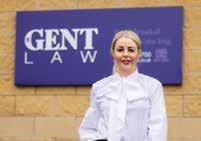
Law firm start-up tips: one year later
In Quill’s recent ‘Starting a law firm: Lessons to survive your first year’ webinar, Managing Director Rachael Gent, who started Gent Law in her dining room, shared her tips with her fellow female panellists on how budding entrepreneurs can launch their own legal practice.
Here’s her story…
How did you get started in law?
Children are often asked what they want to be when they grow up. While others were talking about being a doctor or a policeman, I was immediately drawn to law. Ironically though, I chose to study criminology and law but hated my first year. I decided, before I changed career paths, I would spend some time at a law firm first.
Luckily, this was back in 2007 when the housing market was booming and a large conveyancing firm agreed to take me on as a conveyancing assistant. I ended up working during the day and going to law school in the evening. This employer was a huge advocate for me and paid for my courses. I came out of university with four to five years of solid legal experience behind me and thoroughly enjoyed working at a law firm. By which point, I knew it was the right career.
How did the idea of launching your own law firm come about?
I was chatting with an estate agent friend over coffee. We were both on board with working together and quickly acknowledged we were on to a viable business opportunity worth exploring – a gap in the market for a different type of law firm offering in our area. The two of us became business partners.
The experience gained at my earlier employers gave me the knowledge and confidence to apply my learnings and do it for myself. Gent Law was born and the rest is history.
Describe the start-up process and how you overcame any challenges along the way
The most difficult part was submitting for SRA approval. Regulatory approval took twelve months almost to the day. We used professional consultants from the get-go to help us secure SRA accreditation I would definitely recommend investing in hiring a consultant to speed things along.
Quill has been with us since the very beginning and has served us well. While big corporates have the luxuries of an in-house IT team and on-premise servers, we saved on costs and maintenance by opting for Quill’s cloud-based solution. We chose to use a case management provider for our conveyancing specific needs, which integrates seamlessly with Quill’s legal accounts software.
For me, I knew from my experience at larger law firms that a proper case and practice management system would be a key tool that I’d need to invest in, but I was glad to have the people at Quill backing me – they’ve helped dozens of budding
entrepreneurs like myself get up and running quickly, and they are reasonable and realistic on price. We’ve been pleased with their support and partnership ever since.
How good is your work-life balance?
Usually, I’m strict in finishing work at 5pm each day. Of course, there are always occasions when you forget to do things – run your payroll, for instance – or need to finish off tasks left undone. I often clear the decks in the evening whilst my children are sleeping to get ready to go again the next day!
I fit my two children around work. My children just see our offices as “mummy’s workplace” and are in and out of it all the time –and that’s exactly the way I like it. The pandemic proved that we can all work from home. Quill’s cloud-hosted software greatly assists with flexible working and I actively promote this for all my employees – of whom there are now ten and rising with possibly a new office in our sights in the future.
What parting words of wisdom would you give to other entrepreneurs keen to set up a law firm?
If you’re considering starting your own law firm, brace yourself! It’s worth the reward but you’ll have to put the work in. You’re responsible for others and it’s a weight on your shoulders.
Building client relationships are key as that’s what grows your business. It’s not just about being a qualified solicitor. You wear a lot of hats and must be comfortable with that.
Relationships generally are so important. I’ve already mentioned accessing consultancy support to bridge your skills gaps. Plus choosing the right banking provider as you need someone you can call for ad hoc support in the midst of completions and rely on to ensure your client accounts are accurate at all times.
When planning your finances, budget what you think with more on top. And plan comprehensively and proactively. Your business plan should cover everything and be a live, ever-evolving document.
Invest in the right software for you – choose wisely and consider systems that are hosted and affordable, like Quill. �
Learn more
Read about Quill’s practice management and legal accounts software at www.quill.co.uk/legal-software. Watch Quill’s ‘Starting a law firm: Lessons to survive your first year’ webinar at www.youtube.com/watch?v=eNY6g6_dLd0
CENTRAL LONDON LAWYER | 21 ADVERTISEMENT FEATURE
GCS – Explore our Broad Range of Legal Indemnity Solutions

G
uaranteed Conveyancing Solutions (GCS) is a market-leading provider of legal indemnity insurance for ‘Residential’ and ‘Commercial’ properties and ‘Developments’.
Our comprehensive range of policy solutions are available on an ‘Instant Issue’ basis in our insurance ‘Pack’ and/or our speedy ‘Online’ system. As the name suggests, conveyancing professionals can issue these instantly without referral or delay, so their clients are covered immediately.
Alternatively, conveyancers can simply contact us, by phone or email, to have policies issued ‘Direct’ from our office. No matter how simple or complex the issue is, our experienced and friendly underwriters are always happy to help. Nothing is too much trouble!

Our expert underwriters have an average of 16 years’ underwriting experience. We pride ourselves on our excellent service and fast responses – so
it’s no surprise that we are trusted by over 20,000 conveyancers across the country.
It gets better! We’ve recently added SIX brand NEW policies to our ever-growing policy solutions, and these are available to issue NOW by phoning or emailing our expert underwriters.
� Road Adoption � Sewer Adoption � Combined Adoption of Road & Sewer � Breach of Section 52 or 106 Agreement � Lack of Party Wall Agreement � Rights to Park
These new policies will also be available to issue on GCS ‘Online’ in November 2022, so keep your eyes peeled.
To find out how we can help, please contact us using the details below. For more information, please visit www.gcs-title.co.uk �
22 | CENTRAL LONDON LAWYER ADVERTISEMENT FEATURE
...of market-leading legal indemnity insurance cover for all types of properties and developments. Quotes in seconds, policies in minutes Comprehensively worded policies Competitively priced premiums Multiple issuing options No risk too simple or too complex Expert advice from experienced underwriters Explore our broad range... Guaranteed Conveyancing Solutions Limited (authorised and regulated by the Financial Conduct Authority) Registered in England & Wales No. 3623950 Registered Office: ECA Court, 24-26 South Park, Sevenoaks, Kent, TN13 1DU gcs-title.co.uk 01435 868050 underwriters@gcs-title.co.uk Find out more: www.gcs-title.co.uk/WH Pack Bespoke Online Direct
Avoiding a Pyrrhic Victory:
Enforcing Awards and Judgments in the UK and US
On 1 November, WHLS was pleased to collaborate with the American Bar Association (ABA) for this hybrid event on cross-border enforcement of litigation judgments and arbitration awards focusing on the UK and USA.
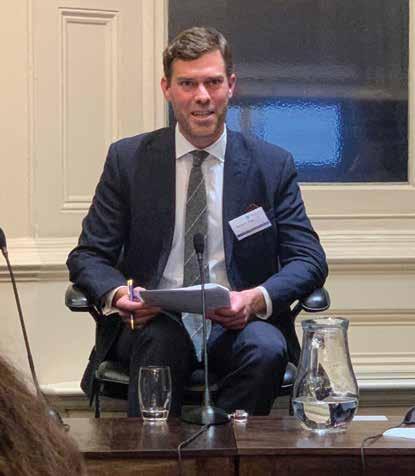

This seminar was kindly hosted in person by Quadrant Chambers and was followed by a networking reception for members and guests. Over 120 American colleagues joined the online program as well, providing unique exposure for WHLS’s work across the US.
The expert panellists for the event were:
� Armeen Mistry Shroff, Troutman Pepper Hamilton Sanders LLP (Detroit)
� Russell Strong, Greenwoods Legal LLP (London)
� Paul Toms, Quadrant Chambers (London)
� Wendy K. Venoit, Cozen O’Conner (Boston)
As Immediate Past President of WHLS - and a disputes lawyer focusing on cross-border litigation and arbitration - I had the pleasure of moderating the discussion.
The aim of the seminar was to provide insights for practitioners to consider at the outset of a dispute to ensure that time and costs were not wasted on a pyrrhic victory. The panelists provided a breakdown of how litigation judgments and arbitration awards were respectively treated on both sides of the Atlantic. The focus then shifted to practicalities such as forum shopping, enforceability and the grounds for an appeal.
Although the topic was of considerable heft, the panelists provided a thorough run through of significant case law developments as well as practical tips on avoiding disputes at the outset of commercial dealings.
The conversation continued following the seminar with a reception in the impressive surroundings of Quadrant Chamber’s library. It was an excellent chance to meet WHLS members and fellow practitioners in a more relaxed environment.
Although non-ABA members were charged $150 to attend the event, WHLS members could attend in person for free. The recording of the seminar is also due to be circulated to our members following its release from the ABA (hopefully by the date of this publication!).
The WHLS International Committee is looking forward to hosting further events with the ABA in the future as well as similar crossborder seminars with our ever-growing number of twinned bar associations. Through such engagements, the Society builds a platform for collaboration and enables members to showcase their expertise on the world stage. I hope to see you at another of our events soon. �
Matthew Allan Immediate Past President of WHLS Vice Chair, International Committee
SUB-COMMITTEES
CENTRAL LONDON LAWYER | 23
Pro Bono Week 2022
Pro Bono Week takes place this year from 7 to 11 November 2022. It is an opportunity to celebrate and discuss how lawyers can volunteer their legal help for free to those in need.
This year one of the key themes will be to showcase and debate how lawyers can respond to crises and emergencies with pro bono help. The cost-of-living crisis is the focus of the official launch event on the evening 7 November, which includes online presentations on the state of the crisis facing the public, whilst offering examples of pro bono help aimed at responding to the need.
An example of such a response is the cost-of-living clinic that Hogan Lovells launched this year in partnership with local charities, to provide pro bono legal help to those struggling as food and fuel prices surge.
Another project launched this year on a collaborate basis by a number of law firms was the Domestic Abuse Response Alliance (DARA). Travers Smith, Beck Fitzgerald, Debevoise & Plimpton, Gibson Dunn & Crutcher, Hogan Lovells, Latham & Watkins, Reed Smith and Slaughter and May teamed up to provide pro bono legal advice and representation to survivors of domestic abuse in need of protective injunctions.
Barristers too can assist on DARA cases. More broadly, barristers have this year continued to provide pro bono help across England and Wales. Advocate, the Bar’s pro bono charity, introduced a scheme entitled “25 for 25: The Pro Bono Challenge” to mark its 25th anniversary, and to celebrate the pro bono work happening at the Bar. Advocate have released data showing that 356 barristers from 126 Chambers across England and Wales completed the Challenge, giving an outstanding 15,434 hours of pro bono time. More broadly, figures released by the Bar Council show that across the Bar, 4,618 barristers carried out some pro bono work in the last year.

Wider afield, the legal profession has during 2022 been involved in helping respond to international crises. Following Russia’s invasion of Ukraine, the Ukraine Advice Project was established to give UK lawyers the opportunity to support those fleeing the war in Ukraine and saw more than 600 immigration specialists volunteering pro bono to help over 4,000 people seeking refuge in the UK.
During Pro Bono Week events will showcase and discuss the following additional themes:
� The climate crisis is real; what can lawyers do? Following COP 26 the desire of many lawyers to tackle climate change is growing. Broad issues include pro bono schemes incorporating a net zero strategy, the voice of the community and the powerful interventions that can happen when clients and in-house teams are involved.
� How to make the business case for pro bono: Events in 2021 underlined the value of pro bono within recruitment and retention, to enhance lawyers’ skillsets and to enable lawyers to make a difference through the law. Law firms and chambers will highlight the impact of their pro bono work and share best practice in pro bono.
� Can remote volunteering truly overcome geographical distance? Many lawyers appreciate remote volunteering, but organisations also stress the importance of going to where community need is located. Discussions will consider what a creative and strategic blend of remote and in-person support looks like.
� Pro bono; an ally of funded advice: Coordinating pro bono so that it works seamlessly alongside funded legal help can be more effective than a solely pro bono intervention. This year the sector will showcase examples where mixed interventions have had a positive impact.
� Specialisation; can lawyers be trained to meet the most urgent needs? Meeting the most urgent legal needs in our communities is a top priority, especially during the cost-ofliving crisis, but the skillset of lawyers with capacity to do pro bono work often does not match the area of need. The question will be posed whether secondary specialisation and investing in increasing supervisory capacity address these issues.
For those interested in attending these events during Pro Bono Week, more details can be found at: https://probonoweek.org.uk
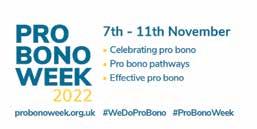
The Week is also an opportunity for individual lawyers, firms, or chambers to sign up to volunteer through one of the profession’s charities, for example LawWorks, Pro Bono Connect and Advocate
Equally, Pro Bono Week is a chance to talk about pro bono on social media, such as the motivations of why lawyers volunteer, or the business benefits of pro bono. The hashtags are #ProBonoWeek and #WeDoProBono
As the Chair of the Organising Committee which includes various pro bono charities, can I conclude by not simply encouraging you to get involved in Pro Bono Week, but to thank you as members of the profession for volunteering on a pro bono basis, at a time when the need for help could not be greater. �
24 | CENTRAL LONDON LAWYER PRO BONO
Toby Brown Barrister, South Square; Chair, Pro Bono Week, UK organising committee
Why pro bono?
The theme of this issue of Central London Lawyer is pro bono. This ties in with the annual National Pro Bono week that took place from 7-11 November.
WHLS has a strong commitment to supporting pro bono legal services. The WHLS pro bono committee has representatives from a variety of law firms, in-house legal teams and pro bono charities. That commitment is underlined by inviting me to be the guest editor for this pro bono edition. If you would like to hear more about our work please email cwhlawsoc@gmail.com
I want to talk about some of the personal and business benefits of taking on pro bono work and address some barriers to greater participation. There are many motivations to work pro bono, all are legitimate and ultimately what matters is the level of service provided to those who need legal support, rather than why their lawyer is doing it.
It’s sometime hard to define exactly what we mean by pro bono legal work. Much takes place unrecorded and outside formal schemes. I think a wide definition helps, which takes in the provision of any legal services without charge to the client.
We should celebrate the range and size of pro bono work that takes place. For example, in 2020 9,000 volunteers helped a staggering 43,000 people in the Lawworks clinic network. High street law firms have always offered services to those in need without charge, fuss and recognition. Leading law firms support many formal partnerships and can take pro bono strategic litigation at a national or international level.
In my day to day work I see volunteer lawyers driven entirely by altruism – a commitment to put themselves out just in recognition of the fact that they can make a difference to someone else’s life. That is a powerful driver whether the lawyer is starting out with strong ideals about using the law to improve society, or more experienced and simply wanting to put something back into a society from a comfortable position.
The legal sector has traditionally had a perceived professional and moral duty to undertake pro bono work because of its specialist knowledge and skills and special place in gatekeeping access to justice. Changes to the profession, funding for legal services and wider society perhaps mean that it is unfair to rely on moral duty to drive pro bono.
Comprehensive data is difficult to find on levels of pro bono activity by lawyers, but it’s clear that there is huge scope for more lawyers to get involved. Barriers to greater participation in pro bono work might include:
� A reluctance to be seen to be replacing services that no longer receive public funding � A perceived lack of knowledge in areas of law that might be useful to clients who need pro bono help � A lack of time amid challenging billable hours targets � A lack of knowledge of suitable opportunities � A perception of regulatory barriers or risks to undertaking pro bono work
Fortunately, many practical barriers to involvement in this list can be addressed by helpful resources published by, amongst
others the Law Society, the SRA and Lawworks (links are provided at the end of this article).
Training and support are available for lawyers who would like to contribute outside their legal practice area, there are directories of available opportunities and in every area of law, however niche, someone who can’t afford it needs advice. For those law firms or in-house teams that don’t organise pro bono there are resources to help get you started.
Perhaps other perceived barriers can be addressed by thinking about pro bono differently. I have no problem working with lawyers who have a more instrumental driver than altruism for their pro bono work. There are many benefits to the lawyer from pro bono. If the lawyer is aware of them that is healthy, and hopefully motivates them to do the best for their client.
Pro bono can be an excellent way to develop a lawyer’s career. FRU works with lawyers who wish to try new areas of law, sometimes because their current practice areas no longer pay sufficiently. Undertaking pro bono work in a supervised setting is a safe way to gain new skills and knowledge. Commercial awareness can be developed through a range of pro bono activities. One of the key roles of the voluntary sector is to identify and fill gaps in current provision, and as an independent voice to challenge the status quo on behalf of people who have been excluded. Pro bono activity can go into brand new areas of need as they develop, as a pathfinder to new commercial opportunities.
It is also clear that whatever the motivation of the lawyer, undertaking pro bono activity is beneficial to their emotional well-being. The buzz of making a significant difference to someone’s life by using your skills is hard to beat, even if you did it for your CV. It has even been linked to improving depression and addressing career torpor.
There are sound business reasons for law firms to prioritise pro bono work. For example, the article by Scott Miller on page 32 demonstrates how his management, interpersonal and legal skills were developed in ways that he simply couldn’t get from his other training seats.
I would urge all those WHLS members reading this edition of Central London Lawyer to consider how they can get involved in pro bono legal work, at whatever level. There will be a clinic, scheme or organisation that could benefit hugely from your skills and knowledge, and you will benefit even if that isn’t your motivation. �
David Abbott is the chief executive of the Free Representation Unit, a pro bono and clinical legal education charity.

Useful resource links
www.lawsociety.org.uk/topics/pro-bono/pro-bono-manual www.lawworks.org.uk/solicitors-and-volunteers/get-involved www.sra.org.uk/solicitors/resources/waivers/waiveremployment-status-pro-bono-work/
CENTRAL LONDON LAWYER | 25 PRO BONO
Actions not Words – Black History Month and Pro Bono

Iwas scanning the Law Society website one day in 2016 and saw an article about the work of the UK Sierra Leone Pro Bono Network. My instant reaction was “I need to be a part of this!” I got in touch with Momo Turay and Richard Honey KC at the Network and the rest as they say is history.
As a British Sierra Leonean lawyer, I felt an instant affinity with the work of the Network and was eager to contribute in some way. I wanted to use my skills and experience as an economic crime investigations and prosecutions expert to help make a difference. The Network is a loose affiliation of lawyers, law enforcement officers, judges and other experts with a Steering Group chaired by Dame Linda Dobbs DBE. I was welcomed with open arms by all and soon become the Anti-Corruption Lead for our work with the Anti-Corruption Commission and the Judiciary in Sierra Leone. I have worked alongside two Commissioners, two Chief Justices and led at least 6 in-country missions since 2017. My pro bono journey has been challenging at times as I struggled to balance building my investigations practice, family life alongside my commitment to this work. There have been times when I didn’t think I could do it anymore and the support of my family and other members of the Network has been invaluable.
The theme for this year’s Black History Month is “Actions not Words” and it aligns perfectly with how I view my pro bono work with the Network. It has allowed me to engage with amazing professionals who work in very difficult circumstances and with limited resources. It has given me the opportunity to build relationships within the institutions we support, that is based on mutual respect and trust. My pro bono work has allowed me to give back to my country of birth by collaborating with other professionals to make an impact. I enjoy the camaraderie amongst members of the Network and admire the passion and steadfast dedication to our work. Whilst I have sought to make a difference through my pro bono work, it has unexpectedly made an even bigger difference to my personal and professional life. �
Lloydette Bai-Marrow CEO/Founding Partner Parametric Global Consulting
The new legal competitive advantage
What should law firms prioritise as we move toward 2023? As new research from legal software provider Clio reveals, the answer above all else is adaptability. Ever-evolving working habits, new client expectations, and challenging market conditions mean that standing still in today’s landscape is the same as going backwards.
Clio’s brand-new Legal Trends Report shows just how profound an impact this constant change is having on law firms. It also highlights how firms can make themselves adaptable (and even antifragile) by adopting legal technology. The right solutions will allow law firms to meet both their clients’ and staff’s expectations –which will play a key role in helping law firms survive in what may be turbulent times ahead.

Why firms must adapt to lawyers’ changing working habits
The pandemic forever changed how lawyers want to work. Indeed, the 2022 Legal Trends Report shows that:
� 44% of lawyers are more likely to want to work throughout the day rather than a traditional 9-to-5 schedule � 45% prefer meeting clients virtually � 49% of lawyers say they prefer to work from home
Client expectations also continue to change
While firms must increasingly cater to their lawyers’ working preferences (especially if they want to keep hold of top talent), client demands are also a paramount concern. The Legal Trends Report found that:
� 35% of clients prefer virtual meetings, compared to 28% who prefer meeting in person � 70% of consumers want the option to pay a lawyer via a payment plan � 68% want to communicate with their lawyers over the weekend
The solution? Cloud-based legal software
Cloud-based legal software plays a vital role when it comes to law firm adaptability. These tools enable seamless virtual collaboration between law firm colleagues, and between lawyers and their clients. They automate administrative work – meaning no more precious hours wasted on low-value tasks. In fact, Clio’s research shows that the impact of legal software extends beyond helping lawyers fulfil their work commitments.
Lawyers using cloud-based legal software to manage their practice were:
� 60% more likely to have positive relationships with their clients � 44% more likely to have positive relationships with colleagues � 29% more likely to be happy with their professional life
These findings are just a snippet of those contained in Clio’s in-depth 2022 Legal Trends Report, the seventh iteration of this industry-leading publication. Based on aggregated and anonymised data from tens of thousands as well as surveys of thousands of legal professionals and consumers, it highlights some of the most pressing issues facing law firms today.
Get your free copy at clio.com/uk/LTR-London �
26 | CENTRAL LONDON LAWYER PRO BONO
Anita Winsome, WHLS Editorial team interviewed Michael Polak, the Director of Justice Abroad
Could you tell us a bit more about Justice Abroad, what kind of services does it offer?
Justice Abroad provides assistance to victims and the families of victims of crime abroad and assists anyone facing legal problems overseas. We work directly with both lawyers around the world, with whom we have a good relationship, as well as those in the United Kingdom who require our expertise to protect their clients’ rights.
The assistance we provide is wide ranging and has involved the co-ordination of the legal and publicity teams in some of the most high-profile international cases such as the Ayia Napa Rape Case, the Beijing Olympics Protest cases in Greece, and the David Hunter mercy killing case. It can also involve the compilation of evidence and the reporting of international crimes to the relevant authorities around the world (as was the case in the Caribbean kidnap case which we are assisting) as well as helping to investigate suspicious deaths in a number of countries abroad. Justice Abroad does not solely act in relation to matters with criminal elements but we also assist in other areas. For example, we are coordinating the probate for an Irish family of a man who passed away in Thailand, a case which presented its own unique challenges, and we are involved in an international family case seeking to ensure that the mother has a fair hearing.
Having someone with a wide view of a client’s problems, who is able to liaise with local lawyers, explain the progress of the case to the client, raise the matter with their diplomatic representatives when they can assist, and deal with any media angle to the case allows the client to be comforted that their side of the story is being advanced in the strongest way possible. We are also able to recommend trusted lawyers in almost every country in the world, with whom we work, as well as provide essential translation and other expert evidences e.g., from psychiatrists and pathologists.
What is the inspiration behind Justice Abroad?
The inspiration behind Justice Abroad was to seek to ensure that those in trouble overseas received the highest possible representation in line with the standards one would expect if they went to a law firm within our jurisdiction, and to work with law firms from our jurisdiction to ensure that their clients are properly represented when something goes wrong overseas. This often falls outside the comfort zone of those who act solely domestically. An example of this was a case of a very highprofile individual who got in trouble in the Mediterranean where there were allegations of Police malfeasance, and the huge organisation to which he belonged managed to allow his defence to be conducted, until we got involved, by the wife of the local police chief. We can really add value to law firms’ representation of their clients abroad by ensuring that this does not happen and can even attend hearings for them and assist with the strategy to be used in court and the witnesses to be called.
Having studied a Master’s degree in Public International Law at the London School of Economics in my first few years of practise as a barrister and writing my dissertation on foreigners’ right to access to their Counsel and the corresponding rights of states to access their nationals abroad when they are detained and the potential remedies when this right has been breached [https://link.springer.com/article/10.1007/s40901-018-0077-8],
and having already by that stage worked across four continents and thus having a fairly decent view as to how things operate overseas, I felt like I was in a good position to offer this service where there was a clear gap in the market.
I was able to gain international experience working on the heartbreaking case of the barrister Ahmad Bin Quasem, Arman to his friends, who was unlawfully seized by the Bangladeshi Security Forces in 2016 and disappeared by the regime there. During this case I worked closely with a number of embassies, conducted press work to gain interest in Arman’s plight, and made applications to UN bodies. Sadly, Arman has not been returned to his wife and two daughters. However, a recent report by Netra News, an investigative Bangladeshi news website, which reported that high-profile detainees are being kept in a supersecret internal detention and torture facility known colloquially as the ‘house of horrors’ has given Arman’s family some hope that they will see him again.
Following this I asked to assist in the Ayia Napa Rape Case which quickly became the most reported legal case in the world. My work in this case involved co-ordinating the legal teams, arranging for expert evidence to be produced for the Court, dealing with numerous press enquiries and interviews, and ensuring that the teenager and her family were kept updated as to what was taking place. The teenager was convicted of Public Nuisance by the District Court after proceedings, which can only be described as atrocious from a fair trials’ perspective, and then appeal submission were put together drawing on both international and common law fair trial provisions, and the case came before the Supreme Court. It was one of the highlights of my career to be there when her unjust conviction was overturned by the Court, and to then give a statement outside Court amongst a large number of local and international women’s rights activists who were there to support her. We have now taken the case in relation to failure to investigate the rape properly to the European Court of Human Rights and a decision there is currently pending.
We now have cases in every continent, bar Antarctica, in almost every area of law.
What types of challenges does Justice Abroad face when offering support?
There are many challenges to assisting clients with their cases abroad. These will vary depending on the jurisdiction. We undertake a lot of work for individuals and groups who are being subject to the most brutal repression by the Chinese Communist Party. This includes Uyghurs who are being placed in concentration camps (menacingly known as ‘re-education camps’ by the CCP regime) or subject to arbitrary lengthy ‘sentences’ after being required to choose which offence they are guilty of. They are being detained solely because of their religion and ethnicity. Unlike Vietnam, who at least engaged in the UN processes when we brought a case against them on behalf of the Vietnamese-Australian pensioner Chao Van Kham, the Chinese state refuses to respond to the United Nations bodies when they order China to reveal the whereabouts of individuals or their release after considering that a flagrant breach of international law has taken place. It is very frustrating that they refuse to engage with the proper international legal procedures. �
CENTRAL LONDON LAWYER | 27 PRO BONO
We are currently bringing the perpetrators of the crimes of genocide, and crimes against humanity before the Courts of Argentina under their universal jurisdiction provisions. We are also carrying out activities to seek to ensure that the West does not continue to treat the relationship with China as business as usual whilst they carry out these international crimes against the most vulnerable in their country.
Obtaining funding for the representation of clients abroad can also be frustrating. Legal aid is not available for those who get caught up in trouble overseas, even when they are facing the most severe penalties, and legal representation abroad can be much more expensive than the same at home. Therefore, families are often left to fundraise for the representation of their loved ones, which can succeed but does not always do so.
You have had a very interesting and varied career journey, what inspired you into the legal profession and your area of expertise?
I left school early to pursue a career in football which did not work out. I then worked in numerous roles such as sales, teaching English as a foreign language, bartending, and security. When I decided that I wanted to pursue further education I went to a college open day as I needed to complete an Access course to enter university. The two courses being offered were business or law routes and there was space on the law route.
When I began my studies at university, I had the aim to join a city law firm and work in corporate law as a solicitor but as I went through my studies, I decided that the Bar was more the place for me.
My general outlook was already fairly international having lived in Australia, Poland, and Italy by that stage, and by the time it came for me to pursue the work experience needed to gain pupillage I decided to undertake this experience in South Africa with a women’s human rights group, and then to spend time at the Khmer Rouge Tribunal where I was posted as an intern with the Defence Support Section. After completing my Master’s degree, I started off taking some international cases on a pro bono basis and now international work makes up around half of my practice.
Private prosecution is a very unique and niche area of expertise, what excites you most about it?
In my domestic work, which often flows from the international cases I take on, I now undertake a number of private prosecution cases, both for individuals and local authorities. This can be for anything ranging from assault to the largest ever prosecution for unlawful eviction.
What excites me about private prosecutions is the ability to obtain justice for those who have been failed by the system and to bring to account those who think that they have escaped responsibility for their actions because of their wealth or influence. Given the huge cuts to Policing and the prosecution of crime in our jurisdiction private prosecution forms a vital safeguard for justice.
Private prosecutions also ties in with my work in relation to assisting the victims of sexual assaults where the stretched Police often do not consider the evidence and potential offences properly, thus denying individuals the opportunity to obtain justice if it wasn’t for their ability to prosecute themselves.
Although there have been limitations placed on private prosecution concerning international crimes by previous
Governments, such as the requirement for AG consent for some offences, private prosecutions and investigations still give the opportunity to seek justice for individuals and groups, when international crimes take place in countries where there are no proper and objective court system.
Private prosecution allows you to be in control of a case, you do not have to rely on anyone else delaying, or not playing, their part. I find it particularly rewarding as justice is achieved a lot quicker and in a smoother fashion.
Throughout your career journey is there any case that particularly stands out or that you would describe memorable, why?
I defended a Turkish Gulenist who escaped from Turkey because he was tortured by the government there. He made his way to the United Kingdom on a small boat across the channel. He took over the steering of the vessel when the conditions became precarious as he was an amateur boater and was prosecuted for facilitating unlawful entry. He had been a big businessman in Turkey, with an engineering company that had a turnover of many millions of dollars and employed a large number of staff. He lived in an expensive area of Ankara with his wife and children and supported a number of underprivileged young people through education as a key tenet of his father. He had everything going for him, but then he was targeted in the purges and spent time in prison. Then he was released pending a further prosecution for some spurious offence. His brother was kept in prison and tortured, and he made the decision that he had to get him and his family out of Turkey.
I think the jury may have been surprised to hear of a refugee who came from a background that was so well off given the portrayal of refugees in the mainstream media.
After all he had gone through, I think it would have been devastating for him to be found guilty and branded a criminal. I made a speech about the martyr John Bradford and his phrase ‘There but for the grace of God goes John Bradford’. Thankfully they acquitted my client, and he is bound to establish himself as a very successful member of our society away from the repression in his home country.
What tips or advice would you like to offer those who are interested in pursuing a career in private prosecutions or international legal assistance?
For international matter it is obviously important to know about what is happening in the world. Keeping abreast with current affairs by reading the newspaper and listening to or watching international news sources such as the BBC or Al Jazeera will help in this regard.
It is also always a good idea to learn as much as you can about different legal systems so that one has the basic knowledge in relation to how a case will be run, how to submit evidence, and the rules in relation to hearsay and experts.
For private prosecutions a good knowledge of the numerous criminal offences is essential to be able to advise on the most appropriate charge to pursue as well as to what evidence and experts may assist in the prosecution. This all comes through experience and defending in criminal cases will assist in gaining this knowledge.
What achievements are you most proud of and why?
I was very proud of the eventual decision in the Cyprus Rape Case by the Supreme Court of Cyprus to overturn the conviction of the teenager. In this case a number of lawyers had told
28 | CENTRAL LONDON LAWYER PRO BONO
me that we had no chance at appeal. However, our team put forward the strongest submissions. This case meant a lot, not just to the family, but also to people around the world who were supporting her. I have no doubt that we will be successful in the European Court of Human Rights in regard to Cyprus’s continuing failure to properly investigate the rape allegations.
What are your interests outside law and the legal profession?
My key interests are spearfishing and playing football. Spearfishing is one of my more calming pursuits; work clears from ones’ mind when you are lying on the bottom of the ocean trying to stay as still as possible with the hope that a fish may swim past. I still play football; in fact, I pursued a professional career in football until a shoulder injury put an end to that dream. I also enjoy swimming especially in the wild and taught swimming whilst studying the Bar course and my undergraduate degree to get me through.
Although I no longer shake cocktails for a living, I do still make them for fun and often run classes for friend’s bachelor parties or special occasions.
When you joined the legal profession, what unforgettable piece of advice did you receive, that you would like to pass on to those joining the legal profession?
During my undergraduate studies, I was taught by a man named Dr Omer Elegab who was a well-known scholar of international law and advised in relation to the Lockerbie Bombing prosecution. His enthusiasm rubbed off on me and he inspired
me and my interest in this area. I dedicated the publication of my dissertation by the Indian Journal of Public International Law to him.
The advice I give when I speak to students or pupil barristers is that the law, much like life, is like a choose your own adventure book (books that were popular when I was younger which are written from a second-person point of view, with the reader assuming the role of the protagonist and making choices that determine the main character's actions and the plot's outcome).
In that it doesn’t matter what area of law one starts out in; you can move towards the cases and areas that inspire you and then your adventure in law is driven by your ambition to go for the type of work about which you are passionate. To do this, individuals can write about new areas, do pro bono work in those areas, and reach out to established practitioners in those areas. The law covers such a wide range of areas and situations and it really is exciting to know that one has a significant degree over ones’ destiny. �
Michael Polak Director of Justice Abroad

Legal disputes and claims in the pharmaceutical sector
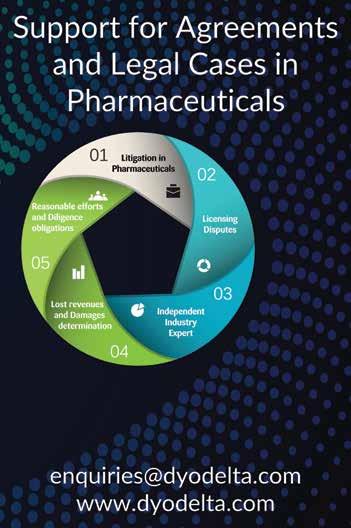
Life Sciences Disputes are some of the most common. According to the World Intellectual Property Organization Center, 15% of arbitration and mediation cases are in the life sciences sector and involve international cases on patents, designs, trademarks, know-how and licensing rights.
When industry alliances are entered into, the intention is to have a successful partnership, but sometimes circumstances result in breaches or expectations not being met, giving rise to disputes between the parties. As the industry involves complex processes, industry experts can be engaged to provide support, advice and opinions both in litigation as well during Alternative Dispute Resolution procedures.
In licensing agreements whereby cases involve claims, lost revenues and damages, independent industry experts can provide valuable help. A licensing agreement typically has substantial monetary value which can reach hundreds of millions. An expert can assess the diligence obligations and provide expert opinion on “industry standards”, estimate potential losses and advise on settlements.
However, it is better to involve industry experts in the original drafting of licensing and collaboration agreements in order to optimise the structure of the agreement and predefine the terms for all the possible scenarios in the future. �
CENTRAL LONDON LAWYER | 29
PRO BONO
Make surgery your legacy
Surgeons save, extend and improve the lives of tens of thousands of people throughout the UK every day. Our work is not limited to specific illnesses or areas of disease but supports innovative care for all ages across all specialties. Almost 5 million surgical patients are admitted to hospital every year in England alone so choosing to leave the Royal College of Surgeons of England a gift in your Will can have a direct impact on the future of surgery and patient care.
Legacy gifts: sisters share vision for the future
Miss Margaret Witt FRCS (1930–2005) was a consultant obstetrician and gynaecologist and was the first female registrar in this specialty at St Bartholomew’s Hospital.
In 2009, her generous legacy founded the Margaret Witt Fund, the income of which is used to award annual scholarships to attend a RCS England course. This opportunity is a grant of up to £1,000 open to RCS England members, or to those working as a specialty or associate specialist doctor at an equivalent level. Between 2009 and 2021, there were 48 awards, benefitting 38 men and 10 women.
Over these 11 years, Margaret’s sister Lorna was advised on the awards given in her sister’s memory. Now in 2022, following the sad news, that Miss Lorna Bartlett (1931–2021) had passed away; we have been honoured with a considerable bequest from her to be placed into the her sister’s fund. Her only additional request to that of Margaret was that every year, at least one award must be given to a woman. Margaret’s bequest and Lorna having then personally seen the successful outcomes of the awards inspired Lorna to support us too. Together, these sisters have ensured the award’s longevity for decades into the future.
Sharing your vision
Gifts in wills are welcome in support of any area of RCS England’s work, you may decide to make an unrestricted contribution, which we can allocate to an area of need at that time. Ultimately, we want to understand what you would like your gift to achieve. All levels of support have a tremendous impact in maintaining and supporting the enhancement of surgical care for patients.
To get in touch, you can email fundraising@rcseng.ac.uk or if you would like an informal chat, please call Nicola on 020 7869 6086 ■
Registered charity no 212808
Surgeons save, extend and improve tens of thousands of lives throughout the UK every day. The Royal College of Surgeons of England is a charity independent of the NHS, safeguarding the experience, treatment and outcomes of each and every one of those surgical patients.
Surgery is special, and there are few people whose lives have not been touched by it. Our work is not limited to specific illnesses or areas of disease, but supports better care for all ages, from minor day surgery, to life-saving procedures and emergency trauma care.
Legacies are vital for us to continue to shape the future, making a real difference to the lives of new generations of surgeons and patients so that they receive the very best care when they need it the most.
To find out how a gift in your will can play a crucial role in our work please contact the fundraising team.
t 020 7869 6086

e fundraising@rcseng.ac.uk w www.rcseng.ac.uk/fundraising #surgerysaveslives
MAKE SURGERY YOUR LEGACY

30 | CENTRAL LONDON LAWYER ADVERTISEMENT FEATURE
A Pro Bono Journey
This November marks the 21st Pro Bono Week. As we reflect upon the success of this year’s pro bono week, many of us in the pro bono community are thinking back to the first steps we made and how far we have travelled.
In 1997, twenty five years ago, Hogan Lovells appointed a full-time, legally qualified, pro bono manager, the first of its kind in Europe. That same year, LawWorks was founded, as the Solicitors Pro Bono Group. The solicitors Pro Bono Group (known to its friends as the SPBG) was founded by a group of law firms to assist the profession in moving towards greater coordination of its pro bono activities. In its first few years, there were a handful of pro bono managers and LawWorks was a mechanism through which to discuss, debate and drive through best practice amongst a growing, but young, pro bono culture. We held our first Pro Bono Conference in 1998, and in 2001 we launched the LawWorks for Community Groups (now known as the Not-for-Profits Programme). The programme was aimed at corporate and in-house lawyers who traditionally had no means to become involved in legal volunteering. The pro bono legal work brokered by the programme work aligned easily with the skill set of the solicitor volunteer but still had an important social purpose. Volunteer lawyers were able to use their existing legal expertise, to help clients without the means to pay, and together make a positive social impact.
Twenty-five years later, this programme remains a flagship LawWorks programme, and we work with over 100 firms and in-house teams to provide support to around 100 not-for-profits every year. The programme has expanded to also include training for not-for-profits and long-term support in the form of a pro bono General Counsel. Working for and with not-for-profits who cannot afford legal advice remains a key element of pro bono work throughout the sector, and a vital source of capacity and resource to those organisations who are fighting for and supporting the most vulnerable people in our society.
Yet, over the past decade we have also seen the expansion of pro bono work ‘for individuals. A decade ago, this work was largely based in community clinics, where lawyers would partner with community organisations to give one off legal advice to local people in need. These clinics provided an opportunity for lawyers, often with corporate expertise, to give back in a very personal way to people with legal needs in their communities. The LawWorks Clinics Network continues to support community clinics on its network of over 300 clinics, however the type of clinics has diversified over the years, not least with the arrival of technology and remote support.
The development of ‘secondary specialisation’ pro bono work, has really expanded the breadth of pro bono work that lawyers can contribute to. This is where, often corporate, solicitors are trained and supervised in an area of law outside their usual expertise. At LawWorks, we have three in-house specialist lawyers who oversee the training and supervision of our members on various areas of social welfare and employment law. There are also many excellent examples of secondary specialisation development in areas of housing, immigration and family law. These projects often provide end-to-end case work for individuals. The work can have a profound impact on both the client and the volunteer. Whilst the client gets the help they vitally need, lawyers feedback the value the work has to them both in terms of professional and personal development.
The wonderful thing about pro bono is that it is a virtuous circle. The client wins, because they are getting the advice, they need but would not otherwise have been able to access; the lawyer wins because they are getting experience, training and client contact, as well as a sense of well-being that may not otherwise be available to them; the firms win because they are able to demonstrate their legal and social values, attracting the best talent and new clients; society wins because access to justice grows.
Pro bono cannot and will never be a replacement for a wellfunded legal aid system. Rather it is a spotlight that can highlight gaps in the system and demonstrate innovative solutions. It is also the best way a solicitor can give their time. At no point in a lawyer’s career do they not have something to give. Students, paralegals, associates, partners, academics, have all found ways to contribute to the pro bono eco-system which in turns contributes to the wider access to justice framework upon which the Rule of Law relies. If you’re not already involved, let November 2022 mark the anniversary of when you started your pro bono journey. �
Rebecca Wilkinson Chief Executive LawWorks

Andrew Acquier FRICS FNAVA
CHARTERED ARTS SURVEYOR

Andrew Acquier FRICS FNAVA has been working as an independent valuer since 1982, specialising in fine art and antiques. Instructions for probate, divorce settlement, tax/asset and insurance valuations as well as expert witness work are regularly received from solicitors and other professionals.
Andrew has many years experience of compiling reports for litigious cases, several of which have necessitated a subsequent court appearance as an expert witness to argue quantum. Divorce valuations are a speciality, usually as Single Joint Expert. Work is carried out throughout the UK and abroad.
23 York Street Broadstairs Kent CT10 1PB
Tel: 0207 353 6440
Mobile: 07787 518 861
Email: andrew@andrewacquier.co.uk
Website: www.andrewacquier.co.uk
CENTRAL LONDON LAWYER | 31 PRO BONO
Why pro bono – the trainee solicitor’s experience
Ispent the last six months of my training contract at the Free Representation Unit (FRU), on secondment from Linklaters. I was attracted to the FRU secondment as I had really enjoyed doing pro bono work in my other seats and I was keen to have exposure to employment law. The FRU secondment therefore suited me perfectly!
Working at the FRU has offered a unique perspective to my training contract: not only did I work on pro bono matters and deal directly with clients on a daily basis, but I have been able to get experience that is not often found in commercial law firms: most of my days are spent doing what the media portrays as the work of a stereotypical ‘lawyer’. I have my own client base that I am responsible for, and a lot of the work revolves around advocacy and hearing preparation, which has allowed me to put the skills I learnt during my training contract to use in a different context.
Going into the secondment, I was looking to take more ownership of the work I did, and this was certainly fulfilled at the FRU. I was given full responsibility for managing both my own caseload and supervising volunteers’ work very soon after I started. Whilst the learning curve was steep, the team were great at making sure I felt supported at every step of the way. Getting such direct hands-on experience was invaluable, and I feel that this in particular has put me on the front foot as I start my role as an associate.
Thanks to the help of its volunteer advocates the FRU manages to make a big difference despite its lean structure: last quarter, FRU staff and volunteers spent 16 days in the Employment Tribunal (including 2 days in Judicial Mediation and 2 days in the Employment Appeal Tribunal); received Employment Tribunal awards of £190,000 and negotiated settlements worth £89,000 on behalf of its clients.
Whilst 6 months didn’t at first appear like a lot of time to get stuck into an organisation such as the FRU (especially without any prior employment law experience!), I was pleasantly surprised by the amount I was able to do. Along with supporting the volunteers I supervised (a skill in itself of reviewing and providing meaningful feedback), I also learnt so much by taking on my own cases: from communicating legal issues to clients in a digestible way and improving my negotiation skills in settlement talks, to keeping multiple plates spinning and improving my oral advocacy representing clients in tribunal.
I have found that settlement negotiations hugely hinge on what each party wants from the process, as the scope for creative solutions is much broader than what a tribunal could award. For instance, one client cared less about the money they would get than the standard confidentiality clause contained in the settlement agreement: they lived and worked in a small community and were worried that they would be penalised if word got out in the town’s gossip mill. We were able to work through this at the last minute by drafting an agreed statement clause that set out the parameters of what both sides could say without breaching the agreement. This was a great opportunity to think slightly outside of the box to meet a client’s needs as well as providing great quality drafting experience.
Being responsible for cases directly has also honed my project management skills: whilst I worked on large multijurisdictional disputes during my training contract, my time at the FRU took this to a new level in terms of personal responsibility. The pinnacle of this has been co-representing a group of 15(!) claimants in a group litigation claim against three different respondents – as you may imagine, there are lots of logistical hurdles involved here on top of the legal ones! In cases as complicated as this, the tribunal is often minded to encourage alternative forms of resolution and, in this case, the judge arranged for a judicial mediation. Myself and my colleague therefore represented the claimants in front of a judge whose goal was to encourage settlement. Whilst I can’t say too much as the case is ongoing, this provided a great opportunity to see how the judicial process can work outside of the standard tribunal procedure and the ways in which a mediator facilitates negotiations.
On another occasion, I had to step in at the last minute to represent a client at a costs hearing as the volunteer became unavailable. Costs aren’t too often awarded in the employment tribunal, and so it was a good opportunity for me to see both how the judge approaches such a situation as well as to get some proper tribunal advocacy experience. Some additional evidence was required from my client at the hearing and so they had to take the oath, which I hadn’t experienced first-hand before.
As I look back on my time at the FRU, I am very grateful to have worked with so many talented individuals to support claimants in what is often one of the most difficult periods of their lives.
Scott was a trainee in his final seat at Linklaters and Qualified in September 2022. �
Scott Miller Associate Herbert Smith Freehills
FRU is celebrating its 50th anniversary this year. If you would like to support the FRU’s work go to wwww.thefru.org.uk/donate

32 | CENTRAL LONDON LAWYER PRO BONO
Three things we can learn from digital-first law firms about technology and conveyancing
By Bronwyn Townsend, Senior Marketing Manager, InfoTrack
Only 5% of law firms scored above 80% when assessed for their digital maturity in the conveyancing process according to the Digital Conveyancing Maturity Index. These firms are the trailblazers. The pioneers. The leaders.
Early adopters are essential for the evolution of an industry. They are those leading the way on the implementation of new systems and keep the needle moving. This remains true with the conveyancing sector too. Law firms which are adopting digital tools are reaping the rewards; time-savings, productivity, and better risk mitigation.
The solutions these leading firms are adopting span the entire conveyancing process from new business management and client onboarding to post-completion. They’re the firms that scored higher than 80% when the industry average is just 43%. These are the firms the rest of the industry will watch and learn from.
What are the key takeaways we can learn from these digital adoption leaders? Based on the Digital Conveyancing Maturity Index, here are the three most important discoveries from the research.
1. Case management system integration is pivotal
To maximise the currently available technology, law firms must integrate their service suppliers with their case management system. Two-way integration, the kind that pushes and pulls data between various digital tools, creates a single source of
truth, saves time, and mitigates many risks associated with the rekeying of data.
2. Automation is key
The pre-completion process is the least mature across the board when it comes to the adoption of digitalisation by conveyancers, with an average score of 30%. It’s also the largest and most labour-intensive part of the process. Automation of administrative tasks and pre-population can all have a major impact on law firm productivity. Automation is also saving these digitally savvy firms hours on manually updating their clients. By using digital tools to automate the process before clients chase, they’re saving hours every week.
3. eSignatures are a quick win 78% of firms are already using eSignatures, though not evenly across the entire process. For the firms already using eSignatures for part of the process, ensure you’re using them for Land Registry and mortgage deeds, not just onboarding. If you’re not using them at all, eSignatures are one of the quickest ways to incorporate digitisation into your conveyancing process and you’ll see the rewards swiftly.
These firms are showing us all that end-to-end digital conveyancing is a reality and it’s available to law firms now. So, why not join them? ■
International Men’s Day 2022
New research into why men in law don’t speak up about mental health
Legal mental health charity has released the findings of its all male focus group to understand the needs of men in law in relation to mental health support in the workplace.
The aim of the focus group, a diverse range of barristers, partners, mid-level and junior associates, in house lawyers as well as those in support roles, from across the jurisdictions, was to understand the mental health experiences of men in law, the barriers to seeking support and what needs to change to encourage more men to seek support.
Despite the increased awareness and understanding of mental health in legal workplaces, there remain significant barriers to men seeking support.
‘Men feel a palpable expectation that they should be strong, not display vulnerability, and be able to shoulder the burden of personal problems themselves without recourse to others. Working as a lawyer adds additional pressure to this sense of needing to appear perfect to the outside world. Generally, men often don’t have the emotional vocabulary to understand or express their experiences effectively and a lack of male role models in positions of responsibility in law, adds to that pressure
to remain stoic’ said Nick Bloy, Founder of Wellbeing Republic, the report author and focus group facilitator.
The charity, which offers free, confidential, emotional support to anyone working in the law including support staff and law students, has undertaken this research following an analysis of its support contacts last year, of which 35% were men. Only 25% of respondents to LawCare’s Life in the Law study last year were men.

Elizabeth Rimmer, Chief Executive of LawCare, said: ‘The recommendations of this report make it clear that there needs to be a joined up and concerted effort across the profession to challenge the stigma that prevents men from speaking up about their mental health and seeking support. We will continue to champion positive change and encourage more male role models to inspire men to seek help when they need it’.
Download the report here lawcare-men-s-mentalhealth-focus-groupjuly-2022.pdf. �
CENTRAL LONDON LAWYER | 33 ADVERTISEMENT FEATURE
Poppy’s second chance at love
oppy’s owner first contacted her local rehoming centre and said she needed to hand Poppy, a four year old Chihuahua cross, over to us as she had sadly recently been given a diagnosis that she had a terminal illness. She was advised to apply for a free Canine Care Card and nominate a Dog Guardian; someone she trusts to sign over the care of Poppy to Dogs Trust should she need it. She’d then be able to spend the most time possible with Poppy and feel reassured that she’d be given the best possible care at Dogs Trust when they could no longer be together.
When Poppy’s Dog Guardian contacted us to advise that her owner was now receiving palliative care and that they needed to activate her Canine Care Card, Poppy was collected by Dogs Trust the very next day. After a vet and behavioural assessment we decided the best place for Poppy would be a loving foster home. We were able to advise the foster carers of all the information we’d been given by Poppy’s owner regarding her life, diet and routine to enable us to make this transitional period as stress-free as possible for Poppy.
Within almost no time, we were able to find very affectionate Poppy a lovely new home for her second chance at love. Poppy’s story is one of many we come across at Dogs Trust.
Many owners are growing increasingly worried about gradually losing their independence or their health deteriorating. Dogs Trust want to offer owners peace of mind that we will be there at this difficult time to care for and rehome their four legged friends should the worst happen.
Therefore we’re pleased to announce that we have extended our Canine Care Card service. Dogs Trust will care for your dog should you move into a care home, become seriously ill or pass away.


For more information on our Canine Care Card service and how to register your dog please type in this link www.dogstrust.org.uk/ccc where you will find our online application form and more information on our free service.
If you have any queries regarding the Canine Care Card please email CCC@dogstrust.org.uk or call 020 7837 0006 and we will be happy to help. �
Who’ll keep her happy when your client’s gone?
We will – as long as your client has a Canine Care Card. It’s a FREE service from Dogs Trust that guarantees their dog a second chance a life. At Dogs Trust, we never put down a healthy dog. We’ll care for them at one of our 21 rehoming centres, located around the UK. One in every four of your clients has a canine companion. Naturally they’ll want to make provision for their faithful friend. And now you can help them at absolutely no cost. So contact us today for your FREE pack of Canine Care Card leaflets – and make a dog-lover happy. E-mail ccc@dogstrust.org.uk Or call 020 7837 0006 Or write to: FREEPOST DOGSTRUSTL (No stamp required) Please quote “334975”
34 | CENTRAL LONDON LAWYER ADVERTISEMENT FEATURE
©
Trust
All information will be treated as strictly confidential. Service only available for residents of the UK, Ireland, Channel Islands & Isle of Man. A dog is for life, not just for Christmas® dogstrust.org.uk Registered charity numbers: 227523 & SC037843
Dogs
2021
P
Take me to
Australia
Win two amazing weeks Down Under with InfoTrack


G’day, InfoTrack is giving you the chance to win a once in a lifetime trip to Australia for you and a mate.
All you need to do is complete your daily legal tasks through InfoTrack. For every eCOS, Contract of Sale, Indemnity, Property Report , or AP1 performed, you’ll get an entry into the prize draw.
No hard yakka required, we’ll automatically enter you each time.
From exploring the ancient Daintree Rainforest and taking in the sights of Sydney Harbour to an arvo admiring Uluru, there’s heaps to do. And if you’re lucky enough, you might even spot a ‘roo.
For more information, visit www.infotrack.co.uk/takemetoaustralia Terms and conditions apply.
CENTRAL LONDON LAWYER | 35


LEAP offers cutting-edge, integrated legal technology expanding beyond traditional practice management software. Visit: leap.co.uk PracticeManagement L e gal Publishing DocumentAssembly & Management LegalAccounti n g The Legal Practice Productivity Solution





 ACCOUNTS DIRECTOR Joanne Casey SALES DIRECTOR Karen Hall
ACCOUNTS DIRECTOR Joanne Casey SALES DIRECTOR Karen Hall

 STUDIO MANAGER Lee Finney
STUDIO MANAGER Lee Finney





































 Felicia Munde Solicitor Dawson Cornwell
Felicia Munde Solicitor Dawson Cornwell







































